PADRES - 1992 Carl's Jr. - COMPLETE TEAM Set (30 cards)
With a not often seen Tony Gwynn card along with Fred McGriff and Gary Sheffield. eBay dealers ask $3+ a card for just the commons.

Please wander around the website for more info, prices, values & images
on vintage baseball, football, basketball, hockey, sport and non-sports cards.
1970/1972/1973 Topps Candy Lids |

Vintage Baseball Card Auction terminology
Register:With name, address & email so we can
contact you after auctions with your winning bids.
Click for more info on my Weekly Vintage BASEBALL CARD AUCTIONS
2 Types of Bidding: [YES] / [NO] auction bids - Click on YES button to make only the next bid. [MAXBID] auction bids - Enter MAXIMUM you would bid on this item. If outbid, auction software makes the next bid if is not more than your auction [MAXBID]. Minimum or Start Bid: More expensive auction items may have minimum or starting bids. Saves time rather than auction bids going up .25 at a time, taking many dozens of bids to reach even fractions of value. Reserve Bid: "Reserve" auction bids come into play after an auction ends. If "Hammer" price is less than "Reserve" bid no sale. Not very auction bidder friendly.
|

Airbrushing is the art of touching up a photo prior to the card being printed. It was generally done to remove imperfections or update or hide a players jersey/cap logo. Because of advancements in print technology and computers this is no longer needed.
All-Star card (AS) usually a subset card picturing a player who participated in the previous seasonís all-star game. Topps created these in their 1958 High Number issue and has continued the practice fairly regularly to date. Such cards are usually designated in price guides with the abbreviation of AS.
Assorted A general mix of cards often containing many duplicates.
Auction items are sold to the highest bidder. Auctions used to be live or thru the mail/phone but today most auctions are online.
Auction Catalog lists the rules and descriptions and often images of the items in an auction.
Authentication verification that an item (card, autograph) is genuine. Most "game-used" material inserts have a written declaration of authenticity on the reverse. Authorized Issue card or memorabilia item that has been properly licensed. If the item is of a player, his written permission must be given in order for it to be considered authorized.
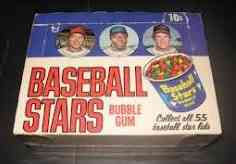
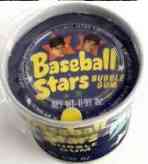 Topps has tried many crazy products, often called "test issues".
Test issues were usually only distributed in limited areas and were difficult
to find. Candy Lids were one of Topps most unusual; little tubs of candy
with player's photos on bottom of the 1 7/8" lids. The 10 cent candy's came 24 to a box.
Sealed tubs can still be found in the $150 to $200 range. Called "Baseball
Stars Bubble Gum", the 1970 Topps Candy Lids set had 24 different
players, while 1973 Topps Candy Lids had 55.
Topps has tried many crazy products, often called "test issues".
Test issues were usually only distributed in limited areas and were difficult
to find. Candy Lids were one of Topps most unusual; little tubs of candy
with player's photos on bottom of the 1 7/8" lids. The 10 cent candy's came 24 to a box.
Sealed tubs can still be found in the $150 to $200 range. Called "Baseball
Stars Bubble Gum", the 1970 Topps Candy Lids set had 24 different
players, while 1973 Topps Candy Lids had 55. 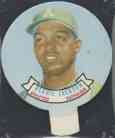
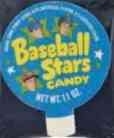
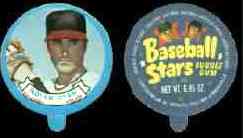 Topps released their first Candy Lids in 1970. The 1970 Topps Candy Lids
are very, very hard to find and had small photos of Tom Seaver,
Carl Yastrzemski and Frank Howard.
Topps released their first Candy Lids in 1970. The 1970 Topps Candy Lids
are very, very hard to find and had small photos of Tom Seaver,
Carl Yastrzemski and Frank Howard. 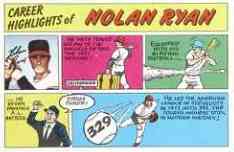 Topps released two other test issue sets in 1973 (1973 Topps Pinups and 1973 Topps Comics).
The 1973 Topps Comics and 1973 Topps Candy Lids shared many photos and again
had no team logos. If thinking "licensing dispute", you are likely right.
Topps received player's union's permission for these test issues, but not
Major League Baseball's. Issues over rights & fees with MLBPA and the player's
union resulted in Topps started shutting down future production of test
issues putting an end to some of their most fun collectibles.
Topps released two other test issue sets in 1973 (1973 Topps Pinups and 1973 Topps Comics).
The 1973 Topps Comics and 1973 Topps Candy Lids shared many photos and again
had no team logos. If thinking "licensing dispute", you are likely right.
Topps received player's union's permission for these test issues, but not
Major League Baseball's. Issues over rights & fees with MLBPA and the player's
union resulted in Topps started shutting down future production of test
issues putting an end to some of their most fun collectibles. 